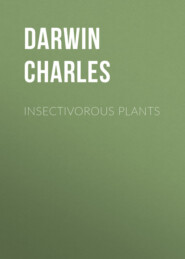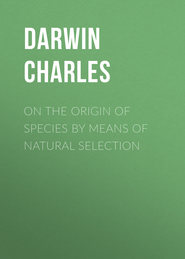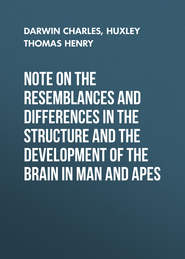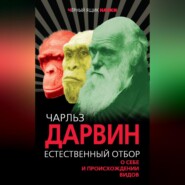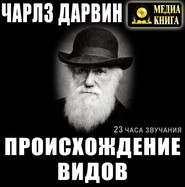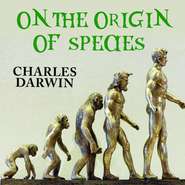По всем вопросам обращайтесь на: info@litportal.ru
(©) 2003-2024.
✖
Charles Darwin: His Life Told in an Autobiographical Chapter, and in a Selected Series of His Published Letters
Настройки чтения
Размер шрифта
Высота строк
Поля
With regard to the third edition, he wrote to Mr. Murray in December, 1860: —
"I shall be glad to hear when you have decided how many copies you will print off – the more the better for me in all ways, as far as compatible with safety; for I hope never again to make so many corrections, or rather additions, which I have made in hopes of making my many rather stupid reviewers at least understand what is meant. I hope and think I shall improve the book considerably."
An interesting feature in the new edition was the "Historical Sketch of the Recent Progress of Opinion on the Origin of Species,"[215 - The Historical Sketch had already appeared in the first German edition (1860) and the American edition. Bronn states in the German edition (footnote, p. 1) that it was his critique in the N. Jahrbuch für Mineralogie that suggested to my father the idea of such a sketch.] which now appeared for the first time, and was continued in the later editions of the work. It bears a strong impress of the author's personal character in the obvious wish to do full justice to all his predecessors, – though even in this respect it has not escaped some adverse criticism.
A passage in a letter to Hooker (March 27, 1861) gives the history of one of his corrections.
"Here is a good joke: H. C. Watson (who, I fancy and hope, is going to review the new edition of the Origin) says that in the first four paragraphs of the introduction, the words 'I,' 'me,' 'my,' occur forty-three times! I was dimly conscious of the accursed fact. He says it can be explained phrenologically, which I suppose civilly means, that I am the most egotistically self-sufficient man alive; perhaps so. I wonder whether he will print this pleasing fact; it beats hollow the parentheses in Wollaston's writing.
"I am, my dear Hooker, ever yours,
"C. Darwin.
"P.S. – Do not spread this pleasing joke; it is rather too biting."
He wrote a couple of years later, 1863, to Asa Gray, in a manner which illustrates his use of the personal pronoun in the earlier editions of the Origin: —
"You speak of Lyell as a judge; now what I complain of is that he declines to be a judge… I have sometimes almost wished that Lyell had pronounced against me. When I say 'me,' I only mean change of species by descent. That seems to me the turning-point. Personally, of course, I care much about Natural Selection; but that seems to me utterly unimportant, compared to the question of Creation or Modification."
He was, at first, alone, and felt himself to be so in maintaining a rational workable theory of Evolution. It was therefore perfectly natural that he should speak of "my" theory.
Towards the end of the present year (1861) the final arrangements for the first French edition of the Origin were completed, and in September a copy of the third English edition was despatched to Mdlle. Clémence Royer, who undertook the work of translation. The book was now spreading on the Continent, a Dutch edition had appeared, and, as we have seen, a German translation had been published in 1860. In a letter to Mr. Murray (September 10, 1861), he wrote, "My book seems exciting much attention in Germany, judging from the number of discussions sent me." The silence had been broken, and in a few years the voice of German science was to become one of the strongest of the advocates of Evolution.
A letter, June 23, 1861, gave a pleasant echo from the Continent of the growth of his views: —
Hugh Falconer[216 - Hugh Falconer, born 1809, died 1865. Chiefly known as a palæontologist, although employed as a botanist during his whole career in India, where he was a medical officer in the H.E.I.C. Service.]to C. Darwin. 31 Sackville St., W., June 23, 1861
My dear Darwin, – I have been to Adelsberg cave and brought back with me a live Proteus anguinus, designed for you from the moment I got it; i. e. if you have got an aquarium and would care to have it. I only returned last night from the Continent, and hearing from your brother that you are about to go to Torquay, I lose no time in making you the offer. The poor dear animal is still alive – although it has had no appreciable means of sustenance for a month – and I am most anxious to get rid of the responsibility of starving it longer. In your hands it will thrive and have a fair chance of being developed without delay into some type of the Columbidæ – say a Pouter or a Tumbler.
My dear Darwin, I have been rambling through the north of Italy, and Germany lately. Everywhere have I heard your views and your admirable essay canvassed – the views of course often dissented from, according to the special bias of the speaker – but the work, its honesty of purpose, grandeur of conception, felicity of illustration, and courageous exposition, always referred to in terms of the highest admiration. And among your warmest friends no one rejoiced more heartily in the just appreciation of Charles Darwin than did,
Yours very truly
My father replied: —
Down [June 24, 1861].
My dear Falconer, – I have just received your note, and by good luck a day earlier than properly, and I lose not a moment in answering you, and thanking you heartily for your offer of the valuable specimen; but I have no aquarium and shall soon start for Torquay, so that it would be a thousand pities that I should have it. Yet I should certainly much like to see it, but I fear it is impossible. Would not the Zoological Society be the best place? and then the interest which many would take in this extraordinary animal would repay you for your trouble.
Kind as you have been in taking this trouble and offering me this specimen, to tell the truth I value your note more than the specimen. I shall keep your note amongst a very few precious letters. Your kindness has quite touched me.
Yours affectionately and gratefully
My father, who had the strongest belief in the value of Asa Gray's help, was anxious that his evolutionary writings should be more widely known in England. In the autumn of 1860, and the early part of 1861, he had a good deal of correspondence with him as to the publication, in the form of a pamphlet, of Gray's three articles in the July, August, and October numbers of the Atlantic Monthly, 1860.
The reader will find these articles republished in Dr. Gray's Darwiniana, p. 87, under the title "Natural Selection not inconsistent with Natural Theology." The pamphlet found many admirers, and my father believed that it was of much value in lessening opposition, and making converts to Evolution. His high opinion of it is shown not only in his letters, but by the fact that he inserted a special notice of it in a prominent place in the third edition of the Origin. Lyell, among others, recognised its value as an antidote to the kind of criticism from which the cause of Evolution suffered. Thus my father wrote to Dr. Gray: "Just to exemplify the use of your pamphlet, the Bishop of London was asking Lyell what he thought of the review in the Quarterly, and Lyell answered, 'Read Asa Gray in the Atlantic.'"
On the same subject he wrote to Gray in the following year: —
"I believe that your pamphlet has done my book great good; and I thank you from my heart for myself: and believing that the views are in large part true, I must think that you have done natural science a good turn. Natural Selection seems to be making a little progress in England and on the Continent; a new German edition is called for, and a French one has just appeared."
The following may serve as an example of the form assumed between these friends of the animosity at that time so strong between England and America[217 - In his letters to Gray there are also numerous references to the American war. I give a single passage. "I never knew the newspapers so profoundly interesting. North America does not do England justice; I have not seen or heard of a soul who is not with the North. Some few, and I am one of them, even wish to God, though at the loss of millions of lives, that the North would proclaim a crusade against slavery. In the long-run, a million horrid deaths would be amply repaid in the cause of humanity. What wonderful times we live in! Massachusetts seems to show noble enthusiasm. Great God! how I should like to see the greatest curse on earth – slavery – abolished!"]: —
"Talking of books, I am in the middle of one which pleases me, though it is very innocent food, viz. Miss Cooper's Journal of a Naturalist. Who is she? She seems a very clever woman, and gives a capital account of the battle between our and your weeds.[218 - This refers to the remarkable fact that many introduced European weeds have spread over large parts of the United States.] Does it not hurt your Yankee pride that we thrash you so confoundedly? I am sure Mrs. Gray will stick up for your own weeds. Ask her whether they are not more honest, downright good sort of weeds. The book gives an extremely pretty picture of one of your villages; but I see your autumn, though so much more gorgeous than ours, comes on sooner, and that is one comfort."
A question constantly recurring in the letters to Gray is that of design. For instance: —
"Your question what would convince me of design is a poser. If I saw an angel come down to teach us good, and I was convinced from others seeing him that I was not mad, I should believe in design. If I could be convinced thoroughly that life and mind was in an unknown way a function of other imponderable force, I should be convinced. If man was made of brass or iron and no way connected with any other organism which had ever lived, I should perhaps be convinced. But this is childish writing.
"I have lately been corresponding with Lyell, who, I think, adopts your idea of the stream of variation having been led or designed. I have asked him (and he says he will hereafter reflect and answer me) whether he believes that the shape of my nose was designed. If he does I have nothing more to say. If not, seeing what Fanciers have done by selecting individual differences in the nasal bones of pigeons, I must think that it is illogical to suppose that the variations, which natural selection preserves for the good of any being, have been designed. But I know that I am in the same sort of muddle (as I have said before) as all the world seems to be in with respect to free will, yet with everything supposed to have been foreseen or preordained."
The shape of his nose would perhaps not have been used as an illustration, if he had remembered Fitz-Roy's objection to that feature (see Autobiography, p. 26). He should, too, have remembered the difficulty of predicting the value to an organism of an apparently unimportant character.
In England Professor Huxley was at work in the evolutionary cause. He gave, in 1862, two lectures at Edinburgh on Man's Place in Nature. My father wrote: —
"I am heartily glad of your success in the North. By Jove, you have attacked Bigotry in its stronghold. I thought you would have been mobbed. I am so glad that you will publish your Lectures. You seem to have kept a due medium between extreme boldness and caution. I am heartily glad that all went off so well."
A review,[219 - Geologist, 1861, p. 132.] by F. W. Hutton, afterwards Professor of Biology and Geology at Canterbury, N. Z., gave a hopeful note of the time not far off when a broader view of the argument for Evolution would be accepted. My father wrote to the author[220 - The letter is published in a lecture by Professor Hutton given before the Philosoph. Institute, Canterbury, N.Z., Sept 12th, 1887.]: —
Down, April 20th, 1861.
Dear Sir, – I hope that you will permit me to thank you for sending me a copy of your paper in the Geologist, and at the same time to express my opinion that you have done the subject a real service by the highly original, striking, and condensed manner with which you have put the case. I am actually weary of telling people that I do not pretend to adduce direct evidence of one species changing into another, but that I believe that this view in the main is correct, because so many phenomena can be thus grouped together and explained.
But it is generally of no use, I cannot make persons see this. I generally throw in their teeth the universally admitted theory of the undulations of light – neither the undulations, nor the very existence of ether being proved – yet admitted because the view explains so much. You are one of the very few who have seen this, and have now put it most forcibly and clearly. I am much pleased to see how carefully you have read my book, and what is far more important, reflected on so many points with an independent spirit. As I am deeply interested in the subject (and I hope not exclusively under a personal point of view) I could not resist venturing to thank you for the right good service which you have done. Pray believe me, dear sir,
Yours faithfully and obliged.
It was a still more hopeful sign that work of the first rank in value, conceived on evolutionary principles, began to be published.
My father expressed this idea in a letter to the late Mr. Bates.[221 - Mr. Bates is perhaps most widely known through his delightful The Naturalist on the Amazons. It was with regard to this book that my father wrote (April 1863) to the author: – "I have finished vol. i. My criticisms may be condensed into a single sentence, namely, that it is the best work of Natural History Travels ever published in England. Your style seems to me admirable. Nothing can be better than the discussion on the struggle for existence, and nothing better than the description of the Forest scenery. It is a grand book, and whether or not it sells quickly, it will last. You have spoken out boldly on Species; and boldness on the subject seems to get rarer and rarer. How beautifully illustrated it is."]
"Under a general point of view, I am quite convinced (Hooker and Huxley took the same view some months ago) that a philosophic view of nature can solely be driven into naturalists by treating special subjects as you have done."
This refers to Mr. Bates' celebrated paper on mimicry, with which the following letter deals: —
Down Nov. 20 [1862].
Dear Bates, – I have just finished, after several reads, your paper.[222 - Mr. Bates' paper, 'Contributions to an Insect Fauna of the Amazons Valley' (Linn. Soc. Trans. xxiii. 1862), in which the now familiar subject of mimicry was founded. My father wrote a short review of it in the Natural History Review, 1863, p. 219, parts of which occur almost verbatim in the later editions of the Origin of Species. A striking passage occurs in the review, showing the difficulties of the case from a creationist's point of view: —"By what means, it may be asked, have so many butterflies of the Amazonian region acquired their deceptive dress? Most naturalists will answer that they were thus clothed from the hour of their creation – an answer which will generally be so far triumphant that it can be met only by long-drawn arguments; but it is made at the expense of putting an effectual bar to all further inquiry. In this particular case, moreover, the creationist will meet with special difficulties; for many of the mimicking forms of Leptalis can be shown by a graduated series to be merely varieties of one species; other mimickers are undoubtedly distinct species, or even distinct genera. So again, some of the mimicked forms can be shown to be merely varieties; but the greater number must be ranked as distinct species. Hence the creationist will have to admit that some of these forms have become imitators, by means of the laws of variation, whilst others he must look at as separately created under their present guise; he will further have to admit that some have been created in imitation of forms not themselves created as we now see them, but due to the laws of variation! Professor Agassiz, indeed, would think nothing of this difficulty; for he believes that not only each species and each variety, but that groups of individuals, though identically the same, when inhabiting distinct countries, have been all separately created in due proportional numbers to the wants of each land. Not many naturalists will be content thus to believe that varieties and individuals have been turned out all ready made, almost as a manufacturer turns out toys according to the temporary demand of the market."] In my opinion it is one of the most remarkable and admirable papers I ever read in my life. The mimetic cases are truly marvellous, and you connect excellently a host of analogous facts. The illustrations are beautiful, and seem very well chosen; but it would have saved the reader not a little trouble, if the name of each had been engraved below each separate figure. No doubt this would have put the engraver into fits, as it would have destroyed the beauty of the plate. I am not at all surprised at such a paper having consumed much time. I am rejoiced that I passed over the whole subject in the Origin, for I should have made a precious mess of it. You have most clearly stated and solved a wonderful problem. No doubt with most people this will be the cream of the paper; but I am not sure that all your facts and reasonings on variation, and on the segregation of complete and semi-complete species, is not really more, or at least as valuable a part. I never conceived the process nearly so clearly before; one feels present at the creation of new forms. I wish, however, you had enlarged a little more on the pairing of similar varieties; a rather more numerous body of facts seems here wanted. Then, again, what a host of curious miscellaneous observations there are – as on related sexual and individual variability: these will some day, if I live, be a treasure to me.
With respect to mimetic resemblance being so common with insects, do you not think it may be connected with their small size; they cannot defend themselves; they cannot escape by flight, at least, from birds, therefore they escape by trickery and deception?
I have one serious criticism to make, and that is about the title of the paper; I cannot but think that you ought to have called prominent attention in it to the mimetic resemblances. Your paper is too good to be largely appreciated by the mob of naturalists without souls; but, rely on it, that it will have lasting value, and I cordially congratulate you on your first great work. You will find, I should think, that Wallace will appreciate it. How gets on your book? Keep your spirits up. A book is no light labour. I have been better lately, and working hard, but my health is very indifferent. How is your health? Believe me, dear Bates,
Yours very sincerely.
1863
Although the battle[223 - Mr. Huxley was as usual active in guiding and stimulating the growing tendency to tolerate or accept the views set forth in the Origin of Species. He gave a series of lectures to working men at the School of Mines in November, 1862. These were printed in 1863 from the shorthand notes of Mr. May, as six little blue books, price 4d. each, under the title, Our Knowledge of the Causes of Organic Nature.] of Evolution was not yet won, the growth of belief was undoubtedly rapid. So that, for instance, Charles Kingsley could write to F. D. Maurice[224 - Kingsley's Life, vol. ii. p. 171.]:







